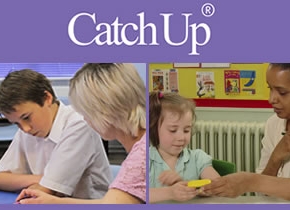
Request a full Catch Up® information brochure and details of our free information webinars
Find out more
More money than you know what to do with?? Well, not quite, but wisely spending Pupil Premium (PP) (or, in Wales, the PDG – Pupil Deprivation Grant) is a time-consuming responsibility, especially as use of that money is included in the performance tables and must also be published online. Schools need to have evidence that they are spending the money on initiatives that will really benefit those disadvantaged pupils.
So how does Catch Up® fit in?
Catch Up® Literacy and Catch Up® Numeracy have statistical evidence of their impact at an individual pupil level, with average ratio gains of 2.2+. (So we know it works!) But it is also easy to calculate the costs per pupil, around £130. (So we know it’s good value!) This also means that it’s dead easy to show that PP money spent on Catch Up® is using it to good effect.
How can progress be reported to Ofsted/Estyn for an individual pupil?
Let’s call her Jane. Jane’s TA attended Catch Up® Literacy and Catch Up® Numeracy training and Jane received Catch Up® Literacy support for two 15-minute sessions per week.
What did Jane’s literacy progress look like?
Jane started on Catch Up® at the end of Year 2, when she was a low 2c in writing and a low 2b in reading. By the end of Year 3, after a year of Catch Up®, Jane achieved 2a in writing and 2b in reading. Catch Up® Literacy was halted but, importantly, Jane’s progress was not:
Catch Up® is the working name of The Caxton Trust, a not-for-profit charity registered in England and Wales (1072425) and Scotland (SC047557) as well as a company limited by guarantee (03476510). Catch Up is a registered trademark.
The Catch Up® Web site use "cookies" to help you personalise your online experience. A cookie is a text file that is placed on your hard disk by a Web page server. Cookies cannot be used to run programs or deliver viruses to your computer. Cookies are uniquely assigned to you, and can only be read by a web server in the domain that issued the cookie to you.
Click on the different category headings below to find out more. You can change your default settings very easily. To turn cookies on, click the button to the right. To turn cookies off, click the buttons to the left. Please read our cookie policy to find out more.
Performance monitoring cookies: Google Analytics cookies (_ga,_gid) - these can last up to 2 years.
Strictly necessary cookies used by the site content management system: PHPSESSID (used to record your logged in session) and allow_cookies (used to record that the user has consented to cookies) - these are either temporary (session) cookies or expire after no more than 30 minutes and are used to provide functionality as you navigate around the site and allow you to access secure areas.